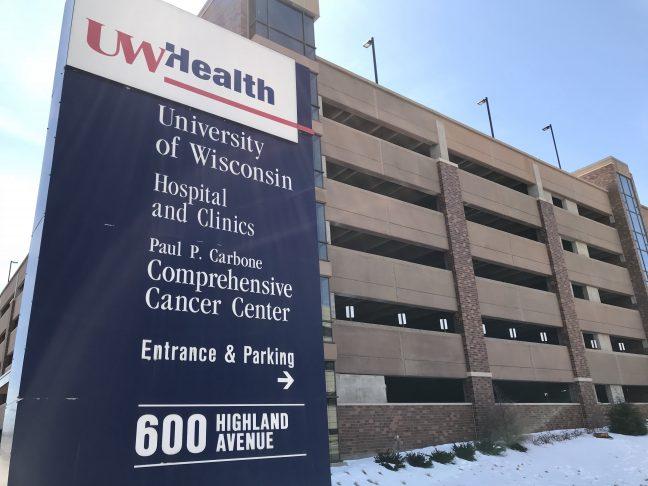As the COVID-19 pandemic continues to grow, hospitals around the country are struggling to keep a supply of personal protective equipment for their healthcare providers. And University of Wisconsin Health is not immune to the shortage.
Like many hospitals around the county, UW Health is accepting various items to protect their healthcare providers. These items include hand sanitizer, masks, gowns, respirators and eye protection, according to their website.
Despite the organization’s call for donations, UW Health has yet to run out of any personal protective equipment. Bob Scheuer, UW Health Director of Materials Management, said there has been an emergency stockpile of equipment kept for years for this type of situation.
“We tried to stay well ahead of the curve,” Scheuer said. “I’ve maintained a PPE emergency stockpile on behalf of UW Health for many years, which has been proven very, very beneficial. I think we are doing better than most because we’ve got an excellent supply chain here.”
Still, Scheuer said it is difficult to obtain certain types of equipment for healthcare providers. Amid complications with typical supply chains, UW Health is only getting a portion of their historical usage of items because of allocation.
In particular, Scheuer said gowns have been difficult to obtain. UW Health uses a specific type of gown certified by the Association for the Advancement of Medical Instrumentation to provide healthcare workers with the utmost protection, Scheuer said.
“It’s challenging because a lot of these items are made in China or Southeast Asia, which of course was the area of the globe initially hardest hit, so their manufacturing, their transportation, their exporting is just now starting to get back on its feet,” Scheuer said. “We’re looking for AAMI level 3 and AAMI level 4 gowns and those are difficult to source … everybody wants them and everybody wants large quantities, so they’re challenging to find.”
With difficulties in getting the correct amount of PPE from original supply lines, Scheuer had to look at a variety of different suppliers and begin to order from them. Some of those new supply lines were local businesses and educators stepping up to help in the production of PPE.
March 16, University Hospital reached out to Lennon Rodgers, Director of the Grainger Engineering Design Innovation Lab at UW, asking Rodgers to create 1,000 face shields for healthcare providers at the hospital caring for COVID-19 patients.
“I didn’t truly understand the situation until I came home that night and my wife, who’s an anesthesiologist at the hospital, confirmed the critical need,” Rodgers said in an email to The Badger Herald. “So, I went to Home Depot and craft stores that night to gather materials, and went into the UW Makerspace to create a prototype.”
Rodgers contacted Jesse Darley, Director of Mechanical Engineering & Principal at Delve, and Brian Ellison, Business Development Manager at Midwest Prototyping, after creating a prototype of the face shield, Rodgers said.
Rodgers, Darley and Ellison came together to create the current design being implemented across the country. The low-cost face shield is made of PET sheets, Polyurethane foam and elastic bands, according to the UW Makerspace website. According to the open-source design, it would cost $1,500 to make 990 face shields.
“We wanted to create a design that could be mass-produced quickly, cheaply and be familiar to healthcare professionals,” Scheuer said. “So, we decided to try to improve the current design through multiple prototypes/iterations and feedback from the hospital.”
Since the creation of the face shield, the group’s partner list has grown to include various companies and manufacturers, including Ford, Microsoft, Trek and Placon according to the Makerspace website.
While national companies stepped up to help in the production of face shields, other, smaller companies were stepping up as well. Rodgers said Wahl Clipper, a company from Rodgers’ hometown, has made 1,000 face shields for hospitals in their area.
“Small-medium sized factories are mobilizing to help their community,” Rodgers said. “Establishing these local connections will be key if hospital demand spikes like NYC and others.”
Engineers and manufacturers are not the only ones stepping up to provide equipment for hospitals. Scheuer said the UW School of Pharmacy made hand sanitizer for UW Health.
Even people at home are taking advantage of new-found free time to help support local hospitals. Members of the Madison community sent Scheuer thousands of emails asking whether UW Health was accepting hand sewn masks.
“We had something like over 3,000 emails of people wanting to do that and unfortunately they’re not clinically effective, they’re a last resort, and there was no standard, so we really couldn’t take them and use them in treating patients,” Scheuer said. “So, we decided to use our efforts for a more standard manufacturing process and that’s what we have been working on as of late.”
Instead, the UW Health website recommends members of the Madison community consider other forms of supporting local hospitals, like donating personal protective equipment or donating to the UW Health COVID-19 Response Fund.


